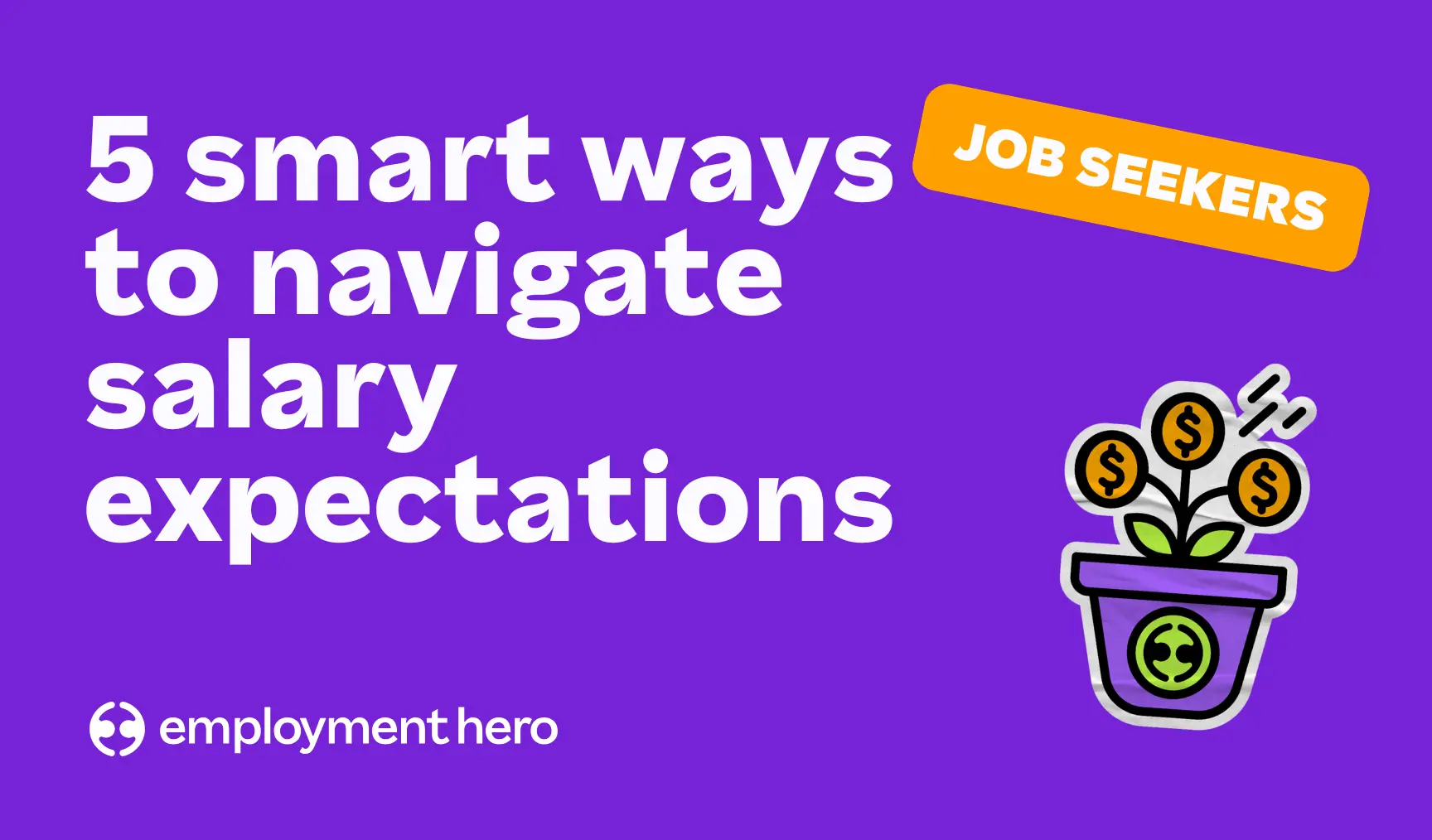How to Answer Salary Expectation Questions: 5 Smart Ways to Navigate Them
Preparing for a job interview can feel like an uphill battle, but with the right preparation, you can approach it with confidence.

Contents
Navigating conversations about salary expectations during a job interview can feel challenging. However, preparing in advance empowers you to confidently express your value while remaining aligned with the employer’s expectations. With the job market evolving in 2025, especially in the UK, understanding salary trends, cultural norms and negotiation strategies is critical to securing a rewarding offer.
This guide outlines actionable strategies for UK-specific hiring practices, helping you confidently answer salary expectation questions and optimise your opportunities in the job market.
Why do employers ask about salary expectations?
Employers use salary expectation questions to gauge whether your compensation needs align with their budget for the role. It’s not just about affordability, it’s also a practical way for employers to assess your understanding of the role’s market value and its responsibilities.
UK hiring practices and regulations
- Budget alignment: Employers often use salary discussions to assess whether you’re a fit financially before proceeding with the hiring process.
- Commitment to fair pay: UK companies are influenced by the Equal Pay Act and initiatives such as Gender Pay Gap reporting, which promote workplace equity and salary transparency.
- Job ad transparency: Many organisations now include salary ranges in job advertisements, helping candidates set clearer expectations during negotiations.
By understanding these motivations, you can tailor your salary discussions to address company priorities alongside your personal goals.
When should I bring up salary expectations in the UK?
Timing is crucial when discussing salary. While employers often lead this conversation, there are specific instances in the UK hiring process when it’s appropriate to bring it up.
- During early recruiter screenings: If speaking with a recruiter, it’s acceptable to clarify the budget range upfront to ensure alignment.
- Midway through interviews: Typically, salary is discussed after your skills and fit for the role have been evaluated.
- With hiring managers: Avoid addressing salary expectations too soon unless asked directly. Cultural norms suggest waiting until later stages unless clarification is necessary.
- Private vs. public sector roles: Note that public sector positions often have fixed pay scales, whereas private companies may offer room for negotiation.
A polite approach might include asking, “Could you share the budgeted salary range for this role so I can ensure my expectations align?”
Five strategies to answer the salary expectation question with confidence
When the salary expectation question arises, preparation is key. Use these strategies to communicate your value while aligning with UK-specific norms and expectations.
1. Research UK salary benchmarks using local sources
Understanding the salary landscape in your role and industry is essential. Use tools such as:
- Employment Hero Salary Benchmarking: Quickly benchmark salaries by role and location.
- LinkedIn Salary Insights: Compare salaries based on your network or job interests.
This information ensures your expectations are realistic and grounded in market data.
2. Offer a salary range, not a specific figure
Providing a range shows flexibility while setting clear boundaries. For example:
- “Given the scope of the role and my experience, I believe a salary between £40,000 and £45,000 would be appropriate, depending on the full package.”
This approach gives room for negotiation and demonstrates an openness to discuss the overall offer.
3. Be flexible, but don’t undersell yourself
Flexibility is valued in UK workplace culture, but it’s important to assert your worth. A professional yet assertive response might be:
- “I’m flexible within a fair range that reflects the responsibilities of the role and my experience.”
This allows you to stay open to negotiation while emphasising your value.
4. Turn the question around politely
If unsure of the salary budget, you can prompt the employer for more information diplomatically:
- “Is there a range you’ve budgeted for this role that we could use as a starting point?”
This not only shifts the discussion but also helps you gauge whether the company’s budget aligns with your expectations.
5. Discuss the whole package, not just salary
Compensation in the UK often includes a mix of salary and benefits. Look beyond base pay and consider other components such as:
- Pension contributions: Does the company offer above-standard employer contributions?
- Holiday allowance: Additional paid leave or ‘buy more days’ schemes can hold significant value.
- Hybrid/flexible working: Many UK employers now offer permanent hybrid working arrangements.
- Private healthcare: Some roles include comprehensive insurance policies.
- Training and development funds: Take note of how the company supports your professional growth.
Assessing the wider package helps determine the role’s long-term value.
What to avoid when discussing salary expectations
Even with preparation, certain pitfalls can weaken your position. Avoid these common missteps:
- Disclosing past salary: Many private companies don’t require you to share this information and doing so could limit your negotiation power.
- Lowballing yourself: Starting too low often results in missed opportunities for better compensation.
- Aggressive negotiation: UK hiring culture values diplomacy. Maintain professionalism by being firm yet polite.
- Overlooking non-monetary benefits: Failing to consider pensions or other perks can lead to undervaluing the overall offer.
By steering clear of these errors, you’ll come across as both knowledgeable and confident.
Post-interview etiquette for salary discussions
Once salary discussions are complete, follow up to reinforce your professionalism:
- Formal thank-you note: Send a courteous email thanking the employer for their time and confirming any agreements.
- Clarify in writing: Document key points discussed around compensation to ensure mutual understanding.
- Tactfully use recruiters: If working with a recruiter, ask them to assist in negotiating details on your behalf.
Example script for recruiters: “Thank you for facilitating this process. Based on our discussion, could you confirm if the client is open to a revised offer around £48,000?”
Sample responses to salary expectations questions for UK companies
Having pre-prepared responses for different situations ensures you appear confident and informed:
- Entry-level candidate:
“Considering my academic background and internship experience, I am seeking a role with a starting salary between £25,000 and £28,000.”
- Mid-level professional:
“With my five years of experience in digital marketing and proven success driving ROI, I feel a salary in the range of £40,000 to £45,000 is appropriate.”
- Senior/executive candidate:
“For a role of this complexity and scope, I am targeting a total value package in the region of £90,000, including benefits.”
Final thoughts: know your worth in the UK market
Your salary reflects the value you bring to a role. By researching market data, understanding UK hiring norms and approaching salary discussions diplomatically, you can advocate for your worth confidently.
Use resources like the Employment Hero Salary Benchmarking Tool to equip yourself with the right information before your next interview. Whether you’re early in your career or climbing to senior leadership, these strategies will ensure you’re prepared to negotiate effectively. Looking for your next job? Start searching for jobs and create your profile to let the best jobs find you.
FAQs
You can politely redirect the question by asking the employer about their budgeted salary range for the role. This shifts the focus and helps you understand if your expectations align with theirs without revealing your current figure. Alternatively, provide a salary range rather than a specific number, demonstrating flexibility while setting clear boundaries.
While employers often lead salary discussions, it’s generally acceptable to clarify the budget range with a recruiter during early screenings to ensure alignment. However, it’s usually best to wait until your skills and fit for the role have been evaluated, typically midway through or in later stages of interviews, unless the employer brings it up directly. Public sector roles often have fixed pay scales, while private companies may offer more room for negotiation.
Generally, you are not required to disclose your past salary in the UK, especially to private companies, as doing so might limit your negotiation power. Focus instead on the value you bring to the role and the market rate for the position.
If your salary expectations are too high, employers may see you as out of alignment with their budget or the role’s market value. Be prepared to justify your asking salary with your experience and skills, or be flexible and open to negotiating. Researching UK salary benchmarks for similar roles on LinkedIn or using Employment Hero’s Salary Benchmarking can help you set realistic expectations.
Yes, salary negotiation can affect your job offer. While a reasonable negotiation based on market value and your experience is often expected and can lead to a better offer, aggressive or unrealistic demands could potentially jeopardise it. It’s important to be diplomatic and base your negotiation on research and the value you bring to the role.
Related Resources
-
 Read more: Is your HR system still stuck in the Stone Age? It’s time to future-proof
Read more: Is your HR system still stuck in the Stone Age? It’s time to future-proofIs your HR system still stuck in the Stone Age? It’s time to future-proof
Manual HR processes create hidden costs and risks. Learn how a future-proof HR system can unlock efficiency, compliance, and business…
-
 Read more: Automate HR Processes: 5 Key Processes You Should be Automating in 2025
Read more: Automate HR Processes: 5 Key Processes You Should be Automating in 2025Automate HR Processes: 5 Key Processes You Should be Automating in 2025
Automating HR processes is no longer a far-off future goal, it’s a strategic necessity. We’re diving into exactly why your…
-
 Read more: AI in HR: How to keep the human in Human Resources and payroll with AI
Read more: AI in HR: How to keep the human in Human Resources and payroll with AIAI in HR: How to keep the human in Human Resources and payroll with AI
Discover how AI can complement human efforts in HR and enable teams to focus on the bigger picture.



















